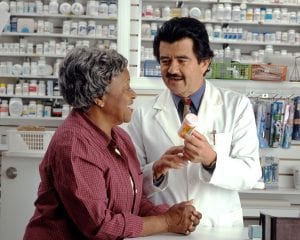
Western medicine can accomplish nearly miraculous things. We are blessed to live in a country with so many medical advances. However, as with most things in life, while there is an upside, there is usually a downside. Our greatest strength can also be our greatest weakness.
This is true when it comes to our prescription medications. Americans consume 75% of the world’s medication according to the National Institute on Drug Abuse. From 2000-2012, the number of Americans taking five or more prescription drugs increased from 8.2% to 15%. Most of those were elders age 65+. Forty-two percent of our elders take 5 or more medications.
This jump in prescription drug use has led to serious adverse drug events leading to increased hospitalizations because patients are being OVER medicated. The problem has become so severe that a study done by the Lown Institute, a medical think tank, estimates that over the next decade we may see as many as 4.6 million hospitalizations of older Americans due to adverse drug events.
5 Major Factors Contribute to Being Over Medicated
First: Instant Fixes vs Prevention
The age of instant gratification and results unfortunately often extends into our health care. Both doctors and patients want instant fixes to chronic diseases associated with aging.
This is despite the CDC reporting that over 80% of chronic disease in this country is caused by poor diet and lifestyle choices. I’ve said it before, but it is worth repeating, you cannot out-supplement or out-medicate a bad diet.
Second: Lack of One Doctor Overseeing Medications

In the “good old days” (which, admittedly were not perfect) we all had a primary care physician (PCP) who oversaw all of our health care. With our current highly specialized medical system, a patient may be seeing several different specialists for various concerns. With many insurance plans it is no longer necessary to have a referral in order to see a specialist. That means a PCP may not even know that their patient has seen a myriad of specialists.
Sometimes this ease of seeing a specialist is great. It can make your healthcare more efficient, reducing the number of office visits and tests that a patient must go through. Not to mention the copays, co-insurance payments and other out of pocket expenses.
The downside is that unless the patient is diligent and accurate in reporting their medications, often one physician doesn’t know what another doctor is prescribing. Unless all the physicians are in the same hospital system, the electron medical records may not contain information on all prescriptions drugs, over the counter drugs, and supplements taken.
 Why is this a problem? Because some medications “don’t play nice” with other medications. Even everyday OTC medications we take to relieve our aching muscles can have an adverse reaction with other prescription medications.
Why is this a problem? Because some medications “don’t play nice” with other medications. Even everyday OTC medications we take to relieve our aching muscles can have an adverse reaction with other prescription medications.
Sometimes a pharmacist may make an excellent catch on medicines that don’t interact well. But that is presuming the patient is getting their prescriptions from the same pharmacy. If you are at the hospital for a procedure your medicines won’t be coming from the same pharmacy, so they are relying on getting accurate information from you and your doctor(s). And then we sometimes get medicines (legally) without going to a pharmacy at all because Doctors will often give patients samples, especially when trying a new medication or if one is expensive or not covered by their insurance.
To complicate matters even more, studies show that patients don’t tell their physicians what supplements they are taking out of shame that they disagree with their doctors. Doctors rarely study supplements and their impacts, an area of study called orthomolecular medicine. They simply tell patients they are wasting their money or blame any unexplained symptoms on the supplements. (Confession time, as a registered orthomolecular health practitioner, I don’t tell my primary what I am taking. I’m trained in this area and she isn’t, so why would I?)
Third: Flawed Pharmaceutical Studies
Studies for the safety and efficacy of prescription drugs typically don’t include the elderly–even when those drugs are given to the elderly. We don’t have evidence to show they are safe in this population.

A good example is statin drugs. Statins are given to lower cholesterol, yet a study conducted in 2018 at the Icahn School of Medicine at Mount Sinai shows that elderly patients who are 84+ years of age actually show better cognitive function with higher cholesterol levels. Admittedly, studies in this area are new and cholesterol’s role in the body is very complex, but this example shows us that our rush to keep cholesterol low may indeed be having a very negative effect on the elderly.
Fourth: Possible Inherent Bias
The protocols for doctors in treating specific diseases are often written by people with ties to the pharmaceutical industry. This doesn’t make the protocols inherently bad. But it does call for specialty societies to take on more responsibilities to examine the research with a critical lens.
Pharmaceutical companies have a goal to sell more drugs. The companies are often involved in designing the studies, and do so in a way to demonstrate the effectiveness of their drugs. The bias here can’t be ignored. This situation is a little bit like asking the fox to guard the hen house.
Fifth: Power of Advertising
 Pharmaceutical companies go beyond designing their own studies. They spend billions in advertising directly to consumers. And these ads are very effective. Patients go to their physicians asking for a specific drug and often walk out with the prescription.
Pharmaceutical companies go beyond designing their own studies. They spend billions in advertising directly to consumers. And these ads are very effective. Patients go to their physicians asking for a specific drug and often walk out with the prescription.
In 1980, direct to consumer advertising was $12 million. Now, direct to consumer advertising is $3 billion.
A report dating back to 2011 reported that for every dollar spent by the pharmaceutical industry, the income is $2.20-4.20. There is certainly no reason to believe that that income has dropped! Advertising is big business because people buy what they are sold. Sadly, for the patient, this ‘successful’ marketing can lead to patients being over medicated while lining the pharmaceutical companies’ pockets.
How Do We Stop Over Medicating of Patients?
The problem of being over medicated is serious and complex.
Wait and See. (Be Patient, Patient)
There are several ways to reduce the problem that rely on waiting. Waiting for the FDA to make changes, waiting for medical schools to change the way doctors are trained, waiting for congress to curb direct to consumer advertising, or waiting for electronic medical records technology to improve. Each of these changes will take years and you may be too old to benefit from them if they are made.
Take Control and Responsibility for Your Health
Instead of waiting for someone else to fix the problem, it is possible to take control—at least for your health.
Consumers do not have to wait. Consumers can get educated on medications—both OTC and prescriptions.
Smart consumers will take responsibility for their own health by partnering with a trained practitioner who looks for the root causes of imbalance in the body. Once the root cause or causes are found and addressed, changes begin to have positive impacts on the body. The great thing about using this approach is the positive side effects versus adverse drug events.
 Do You Suspect a Loved One is Being Over Medicated?
Do You Suspect a Loved One is Being Over Medicated?
If you’re caring for an elderly family member who may be suffering from being over medicated, write down the symptoms that are being experienced.
Then, make a list of all the prescriptions they are taking. Go online and find the list of potential side effects and write them down.
Add to the list all the over-the-counter medications and supplements your loved one is taking.
Ask your doctor to review the list and see what can be reduced or eliminated.
If the physician is unwilling to do this, please call my office. The medical doctor I work with is passionate about helping people optimize health and minimize the need for pharmaceutical drugs.
What will you do?
Will you wait for government entities and giant corporations to make changes to a broken system or will you step away to find a better way? If you’re curious about what that looks like, call the office today, 970-685-8531. We are happy to educate you on what Functional Nutrition can do and how we partner with you to create a plan. Our passion is for a vibrantly healthy community.
